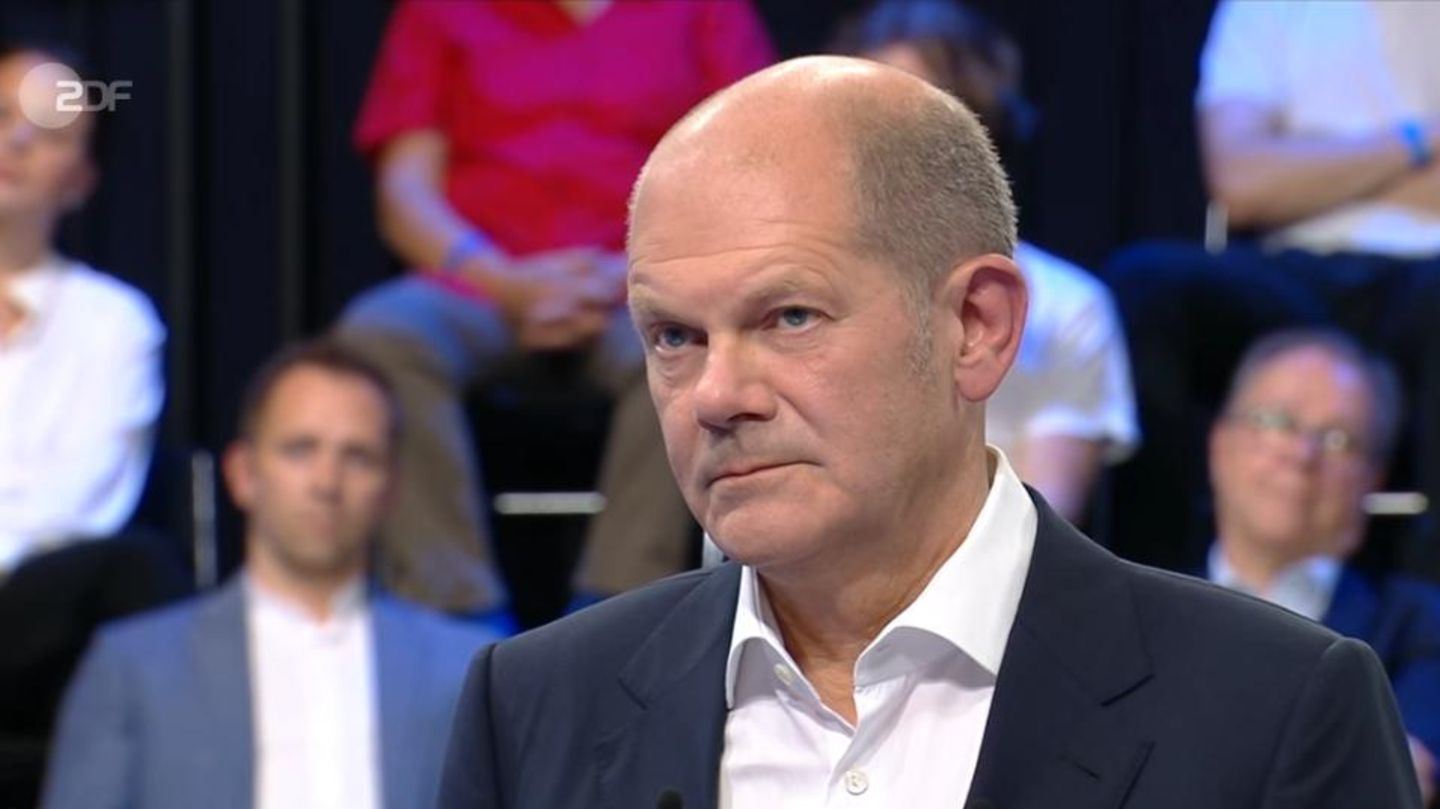The SPD chancellor candidate is supposed to speak “plain text” in front of the citizens on ZDF – and approaches all critics without promising them too much apart from sympathy.
Olaf Scholz has already pretty much perfected his hugging strategy. No matter how much he is attacked, yes: also hostile – he first takes one step towards the others. He understands. He expresses a dismay that one would also like to believe is honest, a sympathy that seems authentic. He is humble, and he usually resists all temptations to attack his political competitors too much.
Nevertheless, he is always enough of a politician not to promise anything too specific in case of doubt, at least nothing that the other person could buy something from. There is almost always just enough that you get the impression: Yes, Olaf Scholz, he cares, or at least he seriously wants to do it. It is then only really concrete at a few points that then get stuck.
Scholz praises himself, but makes little promises
At the same time, the SPD candidate for Chancellor benefits from the format of this program, which promises “plain text” – but also wants to let as many people as possible have their say and at least briefly deal with as many topics as possible. This means that whenever things might get tight for Olaf Scholz in the second question, there is a new topic and the next question. And of course Olaf Scholz has mastered the art of talking off the cuff. But the gift of asking briefly, succinctly and precisely when the world public in the form of television has to listen to you for a moment is only given to a few questioners on this evening.
There is, for example, the woman who raised five children and worked a lot, but invested her money in Wirecard, where it has now been lost. “It’s really bad what happened there,” says Olaf Scholz, “I’m saddened by them”. So: about the “big fraud”. And when the woman then says: “The injured party gets nothing. Nobody is liable for it. That annoys me,” Scholz can refer to the upcoming lawsuits, which would certainly also be initiated by her, and explain the severe consequences for auditors pulled out of the scandal. At first he does not promise the woman anything, and he evades the question of whether he is to blame himself for something verbatim. But of course he thinks: No, he hasn’t.
More apartments and “citizens’ money” instead of Hartz IV
At the same time, he takes his finance state secretary Wolfgang Schmidt under protection, who is targeted by the public prosecutor because of a tweet about the investigation against the money laundering special unit FIU. Yes, he is even using the raid by the public prosecutor’s office in the Federal Ministry of Finance in his favor – to emphasize how much he has expanded the FIU since he took it over from the CDU’s area of responsibility in 2018 – almost 500 instead of 160 employees, soon it will be 700 , and so forth.
Otherwise, the SPD candidate for Chancellor confirmed his goal of replacing the current Hartz IV system, which he had once implemented under Red-Green, with a “citizen’s money” that was “more devoted” to people. “That has to be tackled immediately,” said Scholz. To alleviate the housing shortage, he promises 400,000 new apartments per year, 100,000 of which are socially subsidized. He sees no problems in implementation: In 1973 alone 700,000 new apartments were built in the west. The rent brake should also be “extended” and “tightened”, says Scholz – how exactly, of course, remains open.
Coalition question? Olaf Scholz does not commit himself to that
Otherwise, Scholz presents himself as a fighter for the rights and against the discrimination of transident people. Scholz promises Afghanistan veterans more recognition. Scholz contradicts a carpenter entrepreneur who is afraid of the wealth tax. Scholz argues against tax cuts for high earners like himself. Scholz promises a man from Saxony-Anhalt who absolutely wants to keep saying “Gypsy schnitzel” that he does not want to “re-educate” him. And at one point the SPD politician can even admit a mistake: “We came too late with digitization. It takes too long,” says Scholz, not without mentioning his own merits in this context in the next sentence.
The topic of climate change is neglected – but that is not due to Olaf Scholz – for which there is only a few minutes in the end. Furthermore, he does not want to promise that the coal phase-out will be brought forward in order to achieve the climate targets. And the electricity demand of the industry is his top priority, not renouncing or saving or even less consumption or consumption. Scholz wants to convey the feeling that basically everything can stay as it is in order to stop man-made climate change, as long as the electricity for it is renewable. And of course, in his mind, the economy must keep growing. When the audience asked him about a change in traffic, he secured more money for trains and buses, an expansion of electromobility and an effort to create more space for cyclists and pedestrians.
The last question from ZDF was, of course, one about coalition issues – but, as expected, the candidate for chancellor did not commit himself.
David William is a talented author who has made a name for himself in the world of writing. He is a professional author who writes on a wide range of topics, from general interest to opinion news. David is currently working as a writer at 24 hours worlds where he brings his unique perspective and in-depth research to his articles, making them both informative and engaging.




